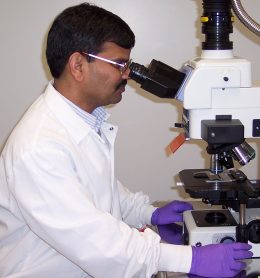Wright State University and the Air Force Research Laboratory (AFRL) are partnering to explore and better understand the stressors that affect pilots and the impact these stressors have on the mission and a pilot’s well-being. This partnership will allow AFRL access to laboratory space within the Boonshoft School of Medicine’s Department of Pharmacology and Toxicology.
Wright State and AFRL recently signed a Cooperative Research and Development Agreement (CRADA) to advance the development of a multi-organ system model that will identify the impact of stressors on pilots during a mission. Stressors can include physical exertion, high temperatures, G-forces, pressure changes, low oxygen levels and exposure to chemical contaminants. These stressors can lead to alterations on a molecular and biochemical level in the body, impacting cognition, vision, hearing, fatigue and potentially hindering performance.
Having a model that focuses on the interactions between the stressors and physiological factors will allow the overall health and welfare of pilots to be studied and increase the understanding of how health, and thus performance, can be affected by changes in the operating environment.
“Our primary objective is to develop scientific knowledge and innovative technologies to support advanced medical science and technology, to sustain and restore Airmen health and performance in multifaceted operational environments,” said Saber Hussain, Ph.D., AFRL 711th Human Performance Wing scientist and project lead. “This agreement gives us the tools we need to better achieve those goals.”
The CRADA will allow AFRL access to the Department of Pharmacology and Toxicology Proteomics and Preclinical Pharmacology labs and the Pharmacology Translational Unit. The Pharmacology Translational Unit participates in clinical research studies and trials, determining if a test or treatment works, improves the patients’ quality of life and is safe. Initial discussions about lab space specifics will happen later this year.
Wright State, through participation in the CRADA, will gain a new avenue through which to offer enhanced professional development opportunities to students, as well as the potential to submit future joint proposals with AFRL that could result in additional funding.
“This collaboration will provide a forum for Wright State University students to improve their analytic skills and capabilities and will present our students with real-world research activities and internships with the Air Force,” said Jeffrey Travers, M.D., Ph.D., professor and chair of the Department of Pharmacology and Toxicology. “Our graduate students will benefit greatly from the close working relationship with, and training provided by, Dr. Hussain and the AFRL team.”
Wright State and Wright-Patterson Air Force Base have a longstanding relationship. This partnership will be a beneficial enrichment of that relationship and fits into Wright-Patterson’s push to connect to outside innovators in their strategies.
“I think these collaborations have more promise than ever, and all involved are excited to see that future unfold,” said Darrin Ott, Ph.D., AFRL 711th Human Performance Wing Aerospace and Operational Medicine Core Technical Competency lead.
The collaboration is a win on many levels and produces an infrastructure for WPAFB Wright State that will add to the research and educational missions of both organizations.
“This partnership not only enriches our scientific and technical expertise, but also gives us an opportunity to work with student scientists and engineers who may become part of our future workforce, all key tenants of the Air Force 2030 Science and Technology Strategy,” Hussain said.


 Wright State psychology team studies ways to identify fatigue in pilots, drivers
Wright State psychology team studies ways to identify fatigue in pilots, drivers  Wright State videographer Kris Sproles wins Regional Emmy and Ohio journalism award
Wright State videographer Kris Sproles wins Regional Emmy and Ohio journalism award  Wright State Boonshoft School of Medicine ranked among the nation’s best for 2024 by U.S. News
Wright State Boonshoft School of Medicine ranked among the nation’s best for 2024 by U.S. News  Exposing biotechnology
Exposing biotechnology  Wright State faculty member Dan Noel uses unique background to inspire new leaders
Wright State faculty member Dan Noel uses unique background to inspire new leaders 